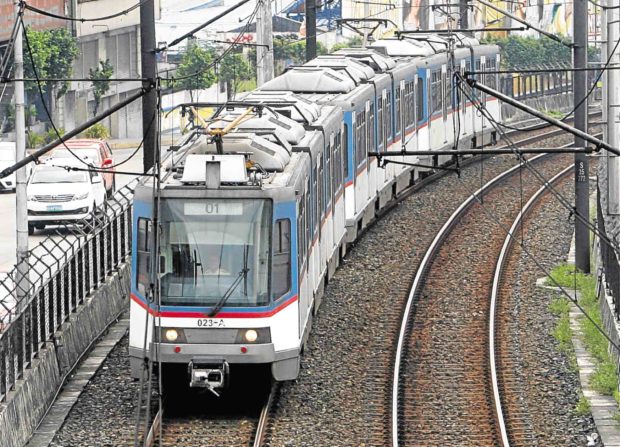
MRT-3 (File photo from Philippine Daily Inquirer)
The perennial woes of the Metro Rail Transit-3 (MRT-3) system can be fixed without stopping its operations provided that it rehires its previous service contractor, its management MRT Corp. (MRTC) said Wednesday.
MRTC confirmed in a statement that Sumitomo Corp.—the MRT-3’s contractor that designed, built, and maintained the train line for 12 years—is willing to return as the maintenance provider of the MRT if hired by MRTC.
“Sumitomo has confirmed its willingness to return as the maintenance contractor of the MRTC if we hire them,” Engr. Frederick Parayno, MRTC president, said in a statement.
READ: MRT 3 shutdown worries MMDA
The MRTC said that Sumitomo had already thoroughly discussed an action plan for the rehabilitation of the MRT-3 with MRTC, which the company had submitted in several letters to Transportation Sec. Arthur Tugade as early as February 2017 as well as to President Rodrigo Duterte. MRTC has also invited the Department of Transportation (DOTr) to join them in their discussions with Sumitomo.
The rehabilitation plan of MRTC includes: a full inspection of the MRT-3 to be completed within 30 days by 100 engineers; the purchase of $50-million worth of spare parts; replacement of broken rails; and the complete overhaul of all 73 cars of the MRT-3.
Parayno said that the rehabilitation could be completed by Sumitomo while the trains continue to be operational, within 26 months from the beginning of the rehabilitation program.
“The MRTC has likewise expressed its willingness to advance the $150 million for the rehabilitation of the trains, to recover later only through fares, even without increasing MRT-3 fares beyond the rates of air-conditioned buses,” the statement read.
Parayno said that the cause of damage to the trains were nothing but “the incompetence and failure of the succeeding maintenance providers to procure spare parts.”
“Sumitomo was effective as a maintenance provider because it was religious in the purchase of spare parts when they were handling the maintenance of the MRT-3 and in fact left $15 million worth of spare parts when their contract was terminated by DOTC (Department of Transportation and Communication),” Parayno explained.
The succeeding companies that took over the MRT’s maintenance, however, failed to purchase spare parts, causing major damage to the MRT-3.
“With any vehicle, whether a streetcar or LRV, it is the failure of the maintenance provider to provide spare parts that is the cause of deterioration if not complete damage,” the MRTC statement read.
The DOTC ended the MRT-3’s contract with the Sumitomo in 2012 over the high cost of contract with the company. /jpv